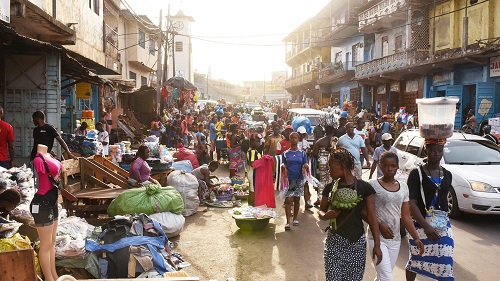
Scientists Baffled and Don’t Understand How Africa Avoids COVID Catastrophe
(ORDO NEWS) — In a bustling market in a poor village outside Harare this week, Nyasha Ndow kept his mask in his pocket while hundreds of other people, mostly without masks, pushed to buy and sell fruits and vegetables displayed on wooden tables and plastic sheets. … As in much of Zimbabwe, the coronavirus is fast fading into the past as political rallies, concerts and home gatherings return.
“COVID-19 is gone, when was the last time you heard that someone died of COVID-19?” said Ndo. “The mask is the protection of my pocket ,” he said. ” The police are demanding bribes, so I lose money if I don’t wear a mask .” Earlier this week, Zimbabwe reported just 33 new cases of COVID-19 and zero deaths, in line with recent declines across the continent, where infections have been declining since July, according to the World Health Organization.
When the coronavirus first emerged last year, health officials feared that a pandemic would sweep across Africa and kill millions of people. While it is still unclear what the ultimate death toll for COVID-19 will be, this catastrophic scenario has yet to materialize in either Zimbabwe or much of the continent.
Scientists emphasize that it is extremely difficult to obtain accurate data on COVID-19, especially in African countries with incomplete surveillance, and warn that the decline in the incidence of coronavirus can easily be reversed.
But something “mysterious” is happening in Africa that baffles scientists , says Wafaa El-Sadr, head of the department of global health at Columbia University. ” Africa does not have the vaccines and resources to fight COVID-19 that Europe and the United States have, but somehow they seem to be doing better ,” she said.
In Africa, less than 6% of the population is vaccinated. For several months, WHO, in its weekly pandemic reports, called Africa “one of the least affected regions in the world.”
Some researchers say the continent’s young population - an average age of 20 versus about 43 in Western Europe - in addition to its slower urbanization and propensity to spend time outdoors , may have saved it from the more deadly effects of the virus. Several studies are investigating the possibility of other explanations, including genetic causes or susceptibility to other diseases.
Christian Happi, director of the African Center of Excellence for Infectious Disease Genomics at the University of the Redeemer in Nigeria, says the authorities are used to containing outbreaks even without vaccines and credits wide networks of community health workers.
“ It’s not always about how much money you have or how perfect your hospitals are ,” he said.
Devi Sridhar, head of the Department of Global Public Health at the University of Edinburgh, said African leaders have not received the praise they deserve for swift action, citing Mali’s decision to close its borders even before COVID-19 arrived.
“ I think there is a different cultural approach in Africa where these countries have approached COVID with a sense of humility because they have experienced things like Ebola, polio and malaria ,” Sridhar said.
In recent months, the coronavirus has hit South Africa and is estimated to have killed more than 89,000 people there, the largest number of deaths on the continent. But so far, African authorities, while acknowledging that there may be gaps, have not reported the sheer number of unexpected deaths that could be attributed to COVID. WHO data show that deaths in Africa account for only 3% of the total number of deaths in the world. By comparison, in the Americas and Europe, mortality rates are 46% and 29%.
In Nigeria, the most populous country in Africa, the government has recorded nearly 3,000 deaths among its 200 million people. In the United States, this number of deaths is recorded every two to three days.
Nigerians like Opemipo Are, a 23-year-old Abuja, are relieved. “ They said there would be corpses and stuff on the streets, but nothing like that happened ,” she said.
Oyewale Tomori, a Nigerian virologist who serves on several WHO advisory groups , says Africa may not even need as many vaccines as the West does. This idea, although controversial, is, he said, seriously discussed among African scientists - and resembles a proposal by British officials made in March last year to allow the COVID-19 virus to freely infect the population to develop immunity.
However, this does not mean that vaccines are not needed in Africa.
” We need to vaccinate to prepare for the next wave,” said Salim Abdul Karim, an epidemiologist at the University of KwaZulu-Natal, South Africa, who previously advised the South African government on COVID-19. “Looking at what is happening in Europe, the likelihood that new cases will spill over here is very high.”
The impact of the coronavirus has also been relatively weak in poor countries like Afghanistan, where experts predicted that outbreaks amid ongoing conflict could be disastrous.
Hashmat Arifi, a 23-year-old student from Kabul, said he had not seen anyone wearing a mask for several months, including at a recent wedding he attended with hundreds of guests. In his university classes, more than 20 students usually sit in masks in a cramped room.
“I haven’t seen a single case of corona lately,” Arifi said. To date, Afghanistan has recorded some 7,200 deaths among its 39 million people, although few tests have been carried out in the context of conflict and the actual number of cases and deaths is unknown.
Back in Zimbabwe, doctors were grateful for the respite from COVID-19 - but feared it was only temporary.
“People need to remain very vigilant,” warns Dr. Johannes Marisa, president of the Zimbabwe Association of Private Practitioners and Dentists. He fears another wave of coronavirus will hit Zimbabwe next month. “Complacency is what will kill us, because we can be taken by surprise.”
—
Online:
Contact us: [email protected]
Our Standards, Terms of Use: Standard Terms And Conditions.






